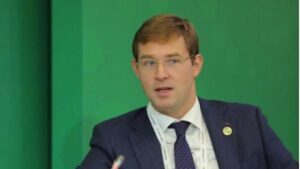Developments in AI will hold the key for Kazakhstan to ‘compete on a global scale’, according to CEO and founder of Nasdaq-listed financial conglomerate Freedom Holding Corp Timur Turlov.
Speaking at the Kazakhstan Economic Freedom High-Level Conference, Turlov explained that new technologies will allow nations such as Kazakhstan to unleash the potential of their workforces ‘in a far more inclusive way’.
Turlov also stressed the importance of remaining technologically advanced in a world of global competition and change, conditions that make it imperative for companies to ‘automate their business process’ to increase labour productivity.
But technology is precisely where Kazakhstan’s young and technologically-savvy population – over 50% of Kazakhstanis are under the age of 29, according to the last national census – may be particularly well placed to capitalise on new opportunities.
Demographics have already helped to transform Kazakhstan into an exciting hub for financial start-ups, where the share of non-cash payments reached 89% in May of this year, according to the National Payment Corporation of Kazakhstan.
This growth is emblematic of the widely-held positivity about Kazakhstan’s status as a centre for financial and technological innovation, which has fuelled the development of a vibrant fintech scene.
Central to this growth has been the Kazakh government’s support for education programmes in AI and tech, which has already seen partnerships agreed with leading technology companies, such as NVIDIA, Amazon and Microsoft, to offer training programs in AI and machine learning.
But more ambitious measures were announced in July of this year, when the country’s Minister for Digital Development, Innovation and Aerospace Industry Zhaslan Madiyev outlined plans for every second university in the nation to teach AI courses by 2029.
The Minister’s remarks are part of a wholistic government-backed AI development programme to 2029, which is touted to see the establishment of a national AI platform.
It’s no wonder therefore that Turlov told the conference that he viewed the government’s ‘support for young people’ as one of the pillars that can propel Kazakhstan’s success in the digital revolution.
The conference, organised by Freedom Holding in partnership with the Reinventing Bretton-Woods Committee, brings representatives from Central Banks, leading financial institutions and global businesses to Kazakhstan’s capital city Astana, who are speaking under the conference’s theme ‘The International Finance System in a New World’.
Freedom’s CEO Timur Turlov expressed his optimism about the country’s future, telling delegates at a panel session entitled ‘The Global Economy in a World of Global Shocks’ that Kazakhstan has a ‘unique opportunity to become a true hub for Central Asian countries’.
The conference itself is evidence of Turlov’s ambitions, attracting a roster of high-profile delegates to the nation’s capital Astana, including Natia Turnava, acting governor of the National Bank of Georgia, Nicolas Blancher, Central Asia division chief at the International Monetary Fund, and Huseyin Ozhan, acting Managing Director for Central Asia at the European Bank for Reconstruction and Development.
For its part, Turlov’s company Freedom Finance, which is headquartered in Kazakhstan’s financial hub Almaty, is heavily invested in Kazakhstan’s digital future.
In recent months Freedom announced a series of eye-catching investment projects, including a $37.5 million East-West data transfer system and a $198.8 million investment in two data processing centres.
They form part of an overarching strategy announced by the country’s President, Kassym-Jomart Tokaev, to transform Kazakhstan into one of Eurasia’s major digital hubs, which has already seen the government invest in a 370-kilometer fibre-optic communications cable under the Caspian Sea through the majority state-owned company KazakhTelecom.
The President’s ambitions are shared by Timur Turlov, who told delegates in one of the conference’s most eye-catching moments that he believed the President’s target to double Kazakhstan’s GDP by 2029 was ‘quite achievable’.
A newcomer to the global financial calendar, the Kazakhstan Economic Freedom High-Level Conference has already set a statement of ambition for the nation’s economic future.
As an exciting new hub for financial and technological innovation, market observers would be wise to keep an eye on Kazakhstan’s eye-catching growth potential.
Read more:
Timur Turlov: AI could allow Kazakhstan to ‘compete on a global scale’















